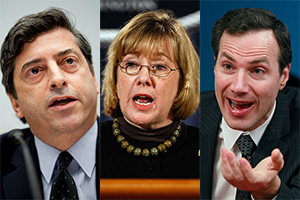 A first hand account of the corrosive regulatory capture caused by the revolving door between token finance regulators and the financial firms that hire them as defence counsel and lobbyists once they leave office.
A first hand account of the corrosive regulatory capture caused by the revolving door between token finance regulators and the financial firms that hire them as defence counsel and lobbyists once they leave office.
“The real world sees a pandemic of bank misconduct, but to the white-collar defense lawyers of Washington, the banks are the victims as they bow beneath the weight of regulators’ remarkably harsh punishments…” See: The Big Bank Backlash:
“These strategies have been employed to glittering success. The guilty pleas and admissions have been largely by subsidiaries or been rendered toothless. Entities have admitted to charges that were narrow or unspecific and did not open up them up to further private litigation. And, of course, no powerful individuals at any of the large, fine-paying companies — Credit Suisse, BNP Paribas, the banks in the rate-manipulation investigations, HSBC, Toyota, General Motors, BP — have been criminally charged. (And we aren’t even talking about financial crisis-related malfeasance.)
This is how power and influence work in Washington. Former top officials, whose portraits mount the walls, weigh in on matters of enforcement. Now working for the private sector, they assail the regulatory “overreach.” Sincerely held or self-serving, these views carry weight in Washington’s clubby legal milieu.
Financial firms led the fight against Eliot Spitzer, the hard-charging former New York attorney general. When the Bush administration issued a set of guidelines for prosecuting corporations that included some relatively tough procedures, the United States Chamber of Commerce and the white-collar bar revolted.
And now, just when corporate punishments are starting to prick the skin, the backlash is in full cry. Former regulators are the mouthpieces. And given what they say in public, one can only imagine what is happening behind closed doors.”


